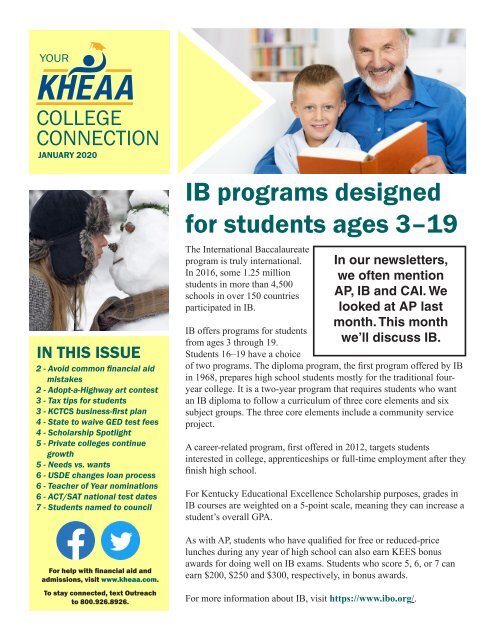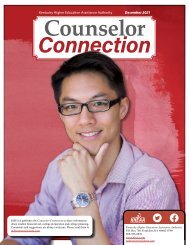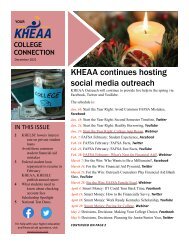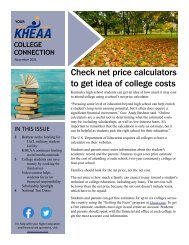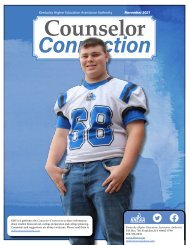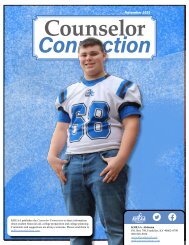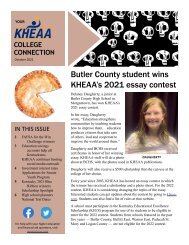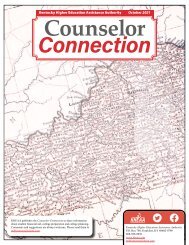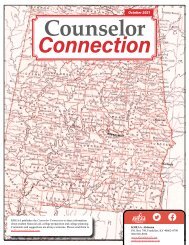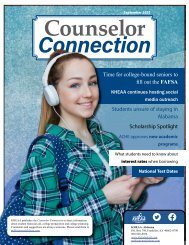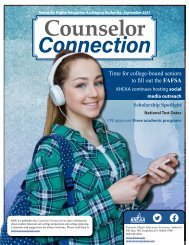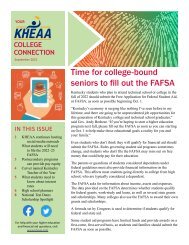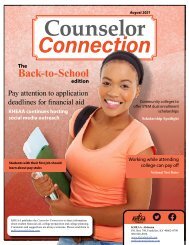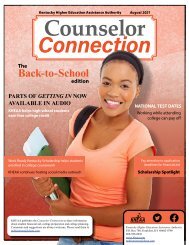YKCC January 2020
Create successful ePaper yourself
Turn your PDF publications into a flip-book with our unique Google optimized e-Paper software.
YOUR<br />
COLLEGE<br />
CONNECTION<br />
JANUARY <strong>2020</strong><br />
IN THIS ISSUE<br />
2 - Avoid common financial aid<br />
mistakes<br />
2 - Adopt-a-Highway art contest<br />
3 - Tax tips for students<br />
3 - KCTCS business-first plan<br />
4 - State to waive GED test fees<br />
4 - Scholarship Spotlight<br />
5 - Private colleges continue<br />
growth<br />
5 - Needs vs. wants<br />
6 - USDE changes loan process<br />
6 - Teacher of Year nominations<br />
6 - ACT/SAT national test dates<br />
7 - Students named to council<br />
For help with financial aid and<br />
admissions, visit www.kheaa.com.<br />
To stay connected, text Outreach<br />
to 800.926.8926.<br />
IB programs designed<br />
for students ages 3–19<br />
The International Baccalaureate<br />
program is truly international.<br />
In 2016, some 1.25 million<br />
students in more than 4,500<br />
schools in over 150 countries<br />
participated in IB.<br />
IB offers programs for students<br />
from ages 3 through 19.<br />
Students 16–19 have a choice<br />
In our newsletters,<br />
we often mention<br />
AP, IB and CAI. We<br />
looked at AP last<br />
month. This month<br />
we’ll discuss IB.<br />
of two programs. The diploma program, the first program offered by IB<br />
in 1968, prepares high school students mostly for the traditional fouryear<br />
college. It is a two-year program that requires students who want<br />
an IB diploma to follow a curriculum of three core elements and six<br />
subject groups. The three core elements include a community service<br />
project.<br />
A career-related program, first offered in 2012, targets students<br />
interested in college, apprenticeships or full-time employment after they<br />
finish high school.<br />
For Kentucky Educational Excellence Scholarship purposes, grades in<br />
IB courses are weighted on a 5-point scale, meaning they can increase a<br />
student’s overall GPA.<br />
As with AP, students who have qualified for free or reduced-price<br />
lunches during any year of high school can also earn KEES bonus<br />
awards for doing well on IB exams. Students who score 5, 6, or 7 can<br />
earn $200, $250 and $300, respectively, in bonus awards.<br />
For more information about IB, visit https://www.ibo.org/.
2<br />
Students should avoid<br />
these common mistakes<br />
when seeking college aid<br />
Many students spend more for college than they<br />
should by making some common mistakes when<br />
seeking financial aid. Follow these tips to make sure<br />
you get the help you need.<br />
Some people don’t bother to apply for financial aid<br />
because they don’t think they’ll qualify. But they<br />
should submit the Free Application for Federal<br />
Student Aid (FAFSA) to find out if they’re eligible for<br />
state and federal student aid programs. Not filing may<br />
hurt their chances of getting free money for college.<br />
Another common mistake is waiting until the last<br />
minute to apply for financial aid. Some programs have<br />
deadlines, while others have limited funds.<br />
Colleges send each student who has applied for<br />
student aid a financial aid package. Students and their<br />
families should look it over carefully. They should<br />
compare offers if they have received packages from<br />
more than one school to see which is the best deal.<br />
Of course, students should also consider other factors,<br />
such as whether a school offers the academic program<br />
a student wants or if it meets other expectations.<br />
Students who need loans to help pay for college<br />
must be good consumers. Not all lenders offer the<br />
same rates and benefits. Borrowers should pay close<br />
attention to what lenders call the back-end benefits:<br />
the interest rate and principal reductions offered when<br />
repaying the loan.<br />
Breanne Wichman, a student at Rich Pond Elementary<br />
School in Warren County, took first place in the 5–8<br />
age group in the 2018 Adopt-a-Highway art contest.<br />
Adopt-a-Highway contest<br />
entry deadline is Feb. 14<br />
Feb. 14 is the deadline for Kentucky students to<br />
submit entries for the annual Adopt-a-Highway art<br />
contest sponsored by the Kentucky Transportation<br />
Cabinet.<br />
Students enrolled in Kentucky public, private or home<br />
schools are eligible.<br />
The contest is divided into four age groups: 5–8,<br />
9–11, 12–14 and 15–18. Winners of each age division<br />
earn a $100 gift card, while second- and third-place<br />
finishers receive a $50 gift card. First- through thirdplace<br />
winners will have their artwork featured in<br />
the Adopt-a-Highway calendar and in the cabinet’s<br />
conference center in Frankfort.<br />
Entries must be postmarked by Friday, Feb. 14.<br />
For more information, including entry forms and<br />
judging criteria, visit transportation.ky.gov/<br />
AdoptaHighway.
Tips may help students<br />
when filing their taxes<br />
Income tax season is approaching, and students may<br />
want to consider these tips to help the process go<br />
more smoothly.<br />
Although students may not have earned enough to be<br />
required to file, they may be able to get a refund if<br />
their employer withheld taxes from their pay. Before<br />
they file, however, they should discuss the situation<br />
with their parents. If parents can claim the student<br />
as a dependent, the parents could save thousands<br />
of dollars. Nearly all high school students will be<br />
considered dependents for tax purposes.<br />
Students and parents may be able to take advantage of<br />
these programs on their federal taxes:<br />
• American Opportunity Credit, available for the<br />
first four years of college.<br />
• Lifetime Learning Credit, available if a taxpayer<br />
or a dependent is taking college courses to acquire<br />
or improve job skills.<br />
• Tuition and fees deduction, which lets taxpayers<br />
deduct qualified education expenses paid during<br />
the year for themselves or a dependent. The<br />
expenses must be for college.<br />
• Student loan interest deduction, which lets<br />
people deduct up to $2,500 per year on federal<br />
taxes for interest paid on federal student loans.<br />
For more detailed information about federal<br />
programs, go to www.irs.gov to download the free<br />
Publication 970 Tax Benefits for Education.<br />
Kentucky also offers a tuition tax credit for<br />
undergraduate students who attend state colleges.<br />
Tax rules may change from year to year, so taxpayers<br />
should make sure they have the most up-to-date<br />
information before filing<br />
KCTCS will spend $2.7M<br />
on its business-first plan<br />
The state’s two-year public colleges are investing<br />
$2.7 million over three years to work with businesses<br />
to close workforce gaps through a new business-first<br />
initiative.<br />
The Kentucky Community and Technical College<br />
System believes that improving its model of<br />
apprenticeships is a win-win for employers and<br />
employees. According to the U.S. Department of<br />
Labor, 91 percent of apprentices across the country<br />
are still employed with their companies after they<br />
complete their program.<br />
The 16 KCTCS colleges work with businesses to<br />
provide locally relevant programs. One program is the<br />
Kentucky Federation for Advanced Manufacturing<br />
Education, through which students earn paychecks<br />
while getting hands-on experience and college credit.<br />
KCTCS has more than 400 advanced manufacturing<br />
partners statewide and 135 business partners who<br />
offer work and learn experiences through KY FAME.<br />
Each college will have a staff member dedicated to<br />
leading the programs in their communities.<br />
3
4<br />
State will waive fees<br />
for students’ GED tests<br />
The state will waive testing fees for Kentuckians<br />
who are trying to earn a GED, according to a Jan. 7<br />
announcement by Gov. Andy Beshear.<br />
The Education and Workforce Development Cabinet<br />
has allotted $600,000 so Kentucky Skills U can waive<br />
the fees. Kentucky Skills U is the state agency that<br />
provides free adult education in all 120 Kentucky<br />
counties.<br />
The GED test fee is one of the most common barriers<br />
facing adults lacking education in Kentucky. More<br />
than half of the 335,000 Kentuckians without a GED<br />
or high school diploma are not part of the state’s<br />
workforce. Beshear said that waiving the fees will<br />
help unemployed or underemployed Kentuckians<br />
get the education they need to place them on a<br />
meaningful career pathway.<br />
Kentucky Skills U students can prepare for the<br />
GED and postsecondary education or receive career<br />
and training for employment. Students may also be<br />
eligible for GED Plus, which allows students to earn a<br />
GED and college credential at the same time through<br />
the Work Ready Kentucky Scholarship.<br />
Kentucky requires students to take the GED Ready<br />
Practice test before they take the GED exam. The<br />
practice test is available from Kentucky Skills U at no<br />
cost or online at ged.com for a fee.<br />
For more information, visit kyskillsu.ky.gov or text<br />
MYGED to 74700 to find a Kentucky Skills U center<br />
near you.<br />
Scholarship Spotlight<br />
Tuskegee Airmen Inc.<br />
General Noel F. Parrish Chapter<br />
Educational Scholarship<br />
Eligibility: Must be a graduating high school senior in<br />
good standing in the year of application, be accepted<br />
at a university or college and have at least a 2.75 GPA.<br />
Must also submit an official copy of student’s schedule,<br />
wallet-size photo, 3 letters of recommendation, a 1-page<br />
personal essay explaining why student should receive<br />
the scholarship, including any contributions made to<br />
better his/her community and listing all aviation or<br />
civic organizations, career goals and aspirations for the<br />
future and a 1-page essay on any experiences, studies,<br />
papers or research student has had about the Tuskegee<br />
Airmen. Essay should be typed and double spaced.<br />
Award: $500<br />
Number: 5 or 6<br />
Deadline: March 1<br />
Contact: Charles Walker, P.O. Box 353, Richmond,<br />
KY 40476; cwalkq@gmail.com; http://bgnfpchapter.<br />
weebly.com/
Degrees awarded by state’s private colleges, universities<br />
State’s private colleges<br />
continue degree growth<br />
Kentucky’s private colleges and universities played<br />
an important role in the record 2018–19 year for<br />
Kentucky degrees and credentials recently announced<br />
by the Council on Postsecondary Education.<br />
Degrees awarded by the Association of Independent<br />
Kentucky Colleges and Universities continued rising<br />
in 2018–19, with AIKCU members awarding 10,926<br />
total degrees and credentials.<br />
This marked the first time that graduate degrees<br />
(5,937) awarded by AIKCU schools exceeded<br />
undergraduate (4,989), according to CPE.<br />
AIKCU members awarded 3.5 percent more<br />
bachelor’s degrees and 42.5 percent more graduate<br />
degrees in 2018–19 than in the previous year. Total<br />
degrees and credentials were up by 21.4 percent.<br />
Over the last ten years, the number of degrees<br />
and credentials awarded by AIKCU members has<br />
increased by 66 percent.<br />
Knowing the difference<br />
between needs, wants<br />
helps students’ finances<br />
A big step to financial<br />
security is learning the<br />
difference between a<br />
need and a want. Students<br />
who learn that difference<br />
will find that their bank<br />
accounts grow more<br />
quickly.<br />
Needs include clothes,<br />
food and, for many<br />
students, transportation.<br />
With clothes, a want may mean wearing only designer<br />
items that cost more than clothes that last just as long<br />
and look just as good.<br />
Students might want to eat a deluxe cheeseburger at<br />
a fast food restaurant every day, even though they<br />
can save money by making their own sandwich and<br />
brown-bagging it.<br />
If a student needs a car, a want would be a new sports<br />
convertible instead of a reliable, used car with good<br />
gas mileage and less flash.<br />
Before making a purchase, students should ask<br />
themselves if they can get by with a less expensive<br />
item — or without that item completely. They should<br />
save the money they don’t spend so it’s there when<br />
they really need something.<br />
5
6<br />
USDE changes loan<br />
borrowing process<br />
The U.S. Department of Education has<br />
changed part of its student loan process<br />
for the <strong>2020</strong>–21 award year, which<br />
begins July 1.<br />
Under the new rules, students and<br />
parents who borrow Federal Direct and Federal PLUS<br />
loans must visit a page that tells them how much they<br />
currently owe in federal student loans. In addition,<br />
they must acknowledge that they have seen this<br />
amount before colleges can disburse any loan funds<br />
for each new award year.<br />
The Informed Borrowing Confirmation process will<br />
be implemented on the studentaid.gov website as<br />
part of the Master Promissory Note process. Student<br />
and parent borrowers must sign the MPN, a promise<br />
to repay what they borrow, before they can receive a<br />
federal student loan.<br />
Nominations open for 2021<br />
Kentucky Teacher of Year<br />
Kentuckians who want to nominate someone for the<br />
2021 Kentucky Teacher of the Year award may do so<br />
now.<br />
Nominations may be submitted electronically at<br />
kentuckytoy.com. The deadline is Feb. 15.<br />
Any full-time public school teacher in the state<br />
with at least three years of experience is eligible.<br />
Teachers may be nominated by students, parents,<br />
peers, principals, superintendents or anyone from<br />
the community who has an interest in honoring an<br />
outstanding educator.<br />
All nominees are required to complete a formal<br />
application, which must be submitted by March 15.<br />
The Kentucky Teacher of the Year will be announced<br />
in Frankfort. At that time, up to 24 finalists will<br />
receive cash awards and other mementos.<br />
The award is sponsored by the Kentucky Department<br />
of Education and Valvoline Inc.<br />
ACT National Test Dates<br />
Test Date Registration Deadline Scores Available<br />
April 4, <strong>2020</strong> February 28, <strong>2020</strong> April 14, <strong>2020</strong><br />
June 13, <strong>2020</strong> May 8, <strong>2020</strong> June 23, <strong>2020</strong><br />
July 18, <strong>2020</strong> June 19, <strong>2020</strong> July 28, <strong>2020</strong><br />
SAT National Test Dates<br />
March 14, <strong>2020</strong> February 14, <strong>2020</strong> March 27, <strong>2020</strong><br />
May 2, <strong>2020</strong> April 3, <strong>2020</strong> May 15, <strong>2020</strong><br />
June 6, <strong>2020</strong> May 8, <strong>2020</strong> July 15, <strong>2020</strong>
7<br />
Students chosen for<br />
state advisory council<br />
Eleven Kentucky public high school students have<br />
been named to the Commissioner’s Student Advisory<br />
Council. They join 11 returning members on the<br />
council.<br />
The new members will serve the remainder of the<br />
school year. Sophomores and juniors may serve again<br />
next fall. The new members are:<br />
• Nicole Arnett, senior, Kentucky School for the<br />
Blind<br />
• Madelyn Blankenship, sophomore, Pulaski<br />
County High School<br />
• Sarah Davenport, senior, Fleming County High<br />
School<br />
• Reece Dicken, junior, Barren County High School<br />
• Rohin Dutt, sophomore, duPont Manual High<br />
School<br />
• Renuka Gentela, junior, Paul Laurence Dunbar<br />
High School<br />
• Elizabeth Holcomb, junior, Kentucky School for<br />
the Deaf<br />
• Solyana Mesfin, sophomore, Eastern High School<br />
• Madison Ortega, senior, Rowan County Senior<br />
High School<br />
• Lauren Shackelford, junior, Corbin High School<br />
• Samuel Smith, sophomore, Daviess County High<br />
School<br />
The students will meet with the state commissioner<br />
of education and Kentucky Department of Education<br />
staff to discuss how state-level decisions affect public<br />
school students. Council members also provide<br />
feedback on issues that impact Kentucky students and<br />
schools.<br />
Send them<br />
off to college.<br />
We’ll handle<br />
the rest.<br />
Plan for your student’s future<br />
with confidence! Get help<br />
paying for their education with<br />
an Advantage Education Loan.<br />
For more details or to apply, visit<br />
AdvantageEducationLoan.com


